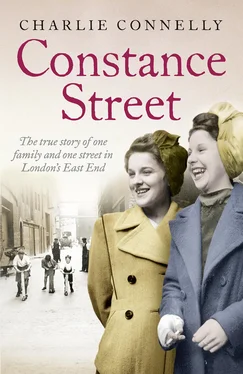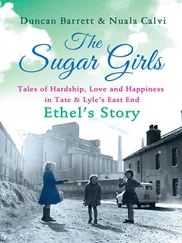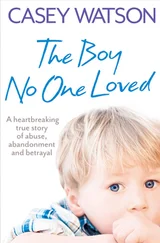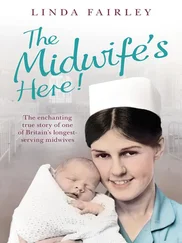She made a rapid mental roll-call of daughters. Annie, Ivy and Rose were here. Kit was with Win, delivering some laundry to North Woolwich. That was farther east, they’d probably be all right. Harry was at the docks collecting some table linen from one of the liners. It was the Albert Dock, so again, farther away from here, he’d be all right too, she reasoned with herself. That left Norah; she had been helping with something at the school a couple of streets away. Drew Road School was a big, solid building. Norah was probably all right. Please, she thought, let all of them be all right.
Through the jangling needles she began to hear crying – Ivy and Annie, 10 and 11 respectively, were at her side, tears streaming down their cheeks. She longed to embrace them but she was still carrying Rose. She nodded at the crib and Annie went over and set it upright. Ivy took the blanket to the broken window and flicked it out a few times before examining it closely for stray shards while Annie ran her hands around the inside of the crib. There didn’t seem to be any glass inside it and, once satisfied it was safe, Nell laid Rose, still sleeping, in the crib, tucked the blankets around her, dropped to her haunches and pulled her older daughters to her, their faces at her breast, and kissed the tops of their heads. The scene was still lit by the malevolent, flickering orange glow from the west that was bathing the room in a curiously soothing light.
‘Nell!’
The cry came from downstairs and she heard frantic footsteps on the broken glass inside the doorway.
‘Up here, Harry.’
The footsteps bounded up the stairs and her husband hurtled into the room, his piercing blue eyes flashing with concern.
‘Are you all right? Are the girls all right?’
‘We’re all right here, I think, yes. Kit and Win are at North Woolwich and Norah’s at the school. What is it? A bombing raid?’
‘Don’t know,’ he replied. ‘I was just on my way back from the Albert, just left the dock gate, when there was this flash in the sky and the next thing I know something’s knocked me off my feet and I’m in the gutter and everyone’s on the ground. I’ve got up and run all the way home. There’s not a window left between here and the docks.’
He thought for a moment.
‘If it’s a bomb, it’s one hell of a bomb.’
‘Stay with the girls, Harry,’ she said, rising to her feet again, ‘and wait here with them. Rose is asleep in the crib. Take them all into the parlour and get a fire going, it’s bloody freezing in here. I’m going round the school to find Norah. I wouldn’t think the trains will be running now so Win and Kit will be walking back and I want someone here when they arrive.’
‘OK, doll,’ he said.‘Try not to worry,’ he added. ‘They’re sensible kids, I’m sure they’re all fine.’
Nellie walked down the stairs, crunched across the broken glass and opened the shop door onto Constance Street. Beneath the fiery twilight the street was dark: the gas lamps had all shattered and blown out. She looked south towards the junction with Connaught Road and the Thames-side factories beyond, and in the gloom saw the silhouettes of men running, some in the direction of the glow, others going the other way. Somewhere, faintly, she heard a woman screaming. White faces loomed in the doorways and windows in the street. Drinkers in Cundy’s had gathered outside – people she knew, Constance Street people. Nellie set off north, though, towards the junction with Drew Road, and just as she got there was nearly knocked clean off her feet as Norah came racing round the corner.
‘Norah, love, are you all right?’
‘Mum! Yes, I’m all right,’ panted the eight-year-old. ‘We were putting away some tables and chairs and suddenly all the windows broke! They sent us home.’
She took Norah’s hand and walked down Constance Street, the way strewn with glass and debris. Each of the half-dozen or so shop-fronts she passed was dark, each window reduced to jagged fragments. On the other side of the street, curtains flapped hesitantly through the broken windows, tugged outside by the chill breeze. Nell paused briefly at some of the gaping shops as she passed, making sure everyone was all right inside, but nobody seemed to know what had happened, just the bright flash, then the pause and then all the windows blowing in.
At the end of the street, opposite the station, a crowd had gathered outside Cundy’s. Still holding Norah’s hand, she joined the group. There was Frank Levitt, the butcher whose shop was next door to the pub. He still wore his butcher’s apron and hat.
‘What is it, Frank?’ she asked. ‘What’s happened?’
He looked at her, his face almost as pale as his apron.
‘You’re cut, Nell,’ he said.
Nellie felt a warm trickle from her right temple, just behind the hairline. She caught it with a forefinger. It wasn’t a serious wound, but she noticed cuts on the backs of her hands too.
‘It’s nothing,’ she said, ‘I’m all right. What’s happened? Are we bombed?’
She thought back to the night a year or so earlier when she’d seen the Zeppelin over Bow, slow and stately, and remembered the elegance of the searchlight beams playing around it, the low and distant hum that she’d felt faintly in her chest, the bright shell-bursts puffing around the giant airship, then the low horizon flashes and the sickening distant thud of bombs dropping. She’d wondered how such beauty could be seen in such a fearful thing.
But this was different, surely. She’d heard no Zeppelin, no hum in the sky, not even the throaty rasp of the Gotha planes they’d begun to use on bombing raids. She looked along Connaught Road towards the glow in the west and saw more shocked people beginning to emerge from their violated homes and businesses. The glow was a good half-mile away, yet there was utter devastation here. This was more damage than a whole squadron of Zeppelins could ever do.
‘We’re not bombed, Nell,’ said Simeon Cundy, the landlord of the pub. ‘It can’t be a bomb. Too big. There ain’t a bomb in the world that could do this.’
‘Unless there’s a new bomb,’ said another voice, ‘a big one, bigger than anything we’ve seen.’
‘Or mines,’ said another, ‘if the Hun has put a mine in the river and a ship’s gone up …’
‘A factory,’ said another man, incredulously. ‘I reckon it must be one of the factories blown up. Gawd bless the poor souls down there anyway.’
A smell of burning grew stronger until it began to irritate their eyes and nostrils, then a dark cloud of thick smoke came billowing through the sky and along the street towards them. The group stood back against the wall of Cundy’s as it drifted past along Connaught Road and over the roofs of Constance Street, darkening everything beneath the fiery twilight. No one spoke, they all stood in silence trying to process the enormity of what might have happened. Then Nellie heard coughing and a man emerged from the darkness. He was limping, his face was blackened and he had his left arm clamped to his side with his right. He was breathless and tired, as if he’d been running, and was shouting something in all directions.
‘Brunner Mond,’ he called in their direction, ‘Brunner Mond’s has blown up! Brunner Mond’s has blown up! It’s all gone!’
Nell’s shoulders drooped. Of course. It would be an exaggeration to say she’d seen it coming, but …
Brunner Mond, an already successful company based in Liverpool, had opened a chemical works at Crescent Wharf in West Silvertown in 1893. In the main factory they made soda crystals, while in the secondary plant on the site they manufactured caustic soda – but this had been discontinued a couple of years before war broke out. In September 1915 the government had requisitioned the old caustic soda works and turned them into a TNT purification plant in order to keep up with the demand for munitions at the front.
Читать дальше












